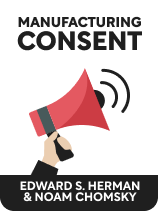

This article is an excerpt from the Shortform book guide to "Manufacturing Consent" by Edward S. Herman and Noam Chomsky. Shortform has the world's best summaries and analyses of books you should be reading.
Like this article? Sign up for a free trial here .
Who decides what news makes it to the press and what doesn’t? How can news gatekeepers skew the public’s perception of affairs?
In their book Manufacturing Consent, authors Chomsky and Herman believe that the elite control the news and media. By deciding what issues to focus on, they manipulate the beliefs of the general public.
Here’s how media plays into the elite’s agenda.
Deciding Who Matters and Who Doesn’t
Chomsky and Herman argue that the media frames issues in a way that serves the interests of the elite, thus they act as news gatekeepers.
One way they do this is by defining the terms of the narrative—limiting the terms of debate by deciding which actors are and aren’t worthy of coverage and attention. They further contend that these judgments of newsworthiness nearly always align with the political preferences of the U.S. government. The authors observe that this tendency is particularly striking in how the American press covers foreign affairs.
Thus, human rights abuses in states allied with the U.S. tend to be ignored or downplayed. Meanwhile, human rights abuses in states opposed to the U.S. tend to be given extensive, emotion-laden, and overtly sympathetic coverage.
For example, the U.S.-allied Saudi Arabian royal family heads a regime that is widely regarded as authoritarian and repressive—it forbids women from getting married or traveling internationally without the permission of a male guardian and punishes homosexuality by death.
Yet, when members of that royal family travel to the U.S., they are given laudatory and fawning media coverage, while their record of human rights abuses is swept under the rug. Meanwhile, the mainstream American press spares few opportunities to vigorously and aggressively condemn the human rights record in adversarial states like Iran.
| The Mainstream Media: Cheerleaders for American Militarism? In this section, the authors argue that the American press has a strong tendency to endorse the U.S. government’s views as they relate to foreign policy, propping up foreign allies while denigrating foreign opponents. Some critics have extended this critique to argue that the press plays a vital role in ginning up domestic support for American military actions—with the 2003 U.S. invasion of Iraq standing out as a notable example. Indeed, some media observers have called the press’s performance in the run-up to the March 2003 invasion the worst collective failure of the media in modern history. They argue that the mainstream press did little to counter government claims that the Iraqi regime was harboring vast stockpiles of weapons of mass destruction (claims that were later revealed to be untrue) while marginalizing anti-war voices and stigmatizing those skeptical of the war as unpatriotic. In fact, subsequent investigations revealed that the Pentagon played an active role in shaping pro-military media coverage of the Iraq War. The Pentagon worked closely with the Bush White House to get their preferred “military analysts”—often allied military contractors, lobbyists, and board members with billions of dollars to gain from the prosecution of the war—onto cable news to make the case for invasion. The analysts’ financial stake in the war was seldom, if ever, disclosed to audiences, giving viewers no way of knowing that the content they’d seen had been all but explicitly created and endorsed by the U.S. military establishment. Moreover, after the invasion of Iraq, the U.S. media consistently downplayed or delayed reporting on human rights abuses committed by the American military, just as they downplayed the human rights abuses of U.S.-allied countries. Shortly after the invasion in 2003, the military and the CIA began subjecting Iraqi detainees to torture and sexual abuse at Abu Ghraib prison near Baghdad. Although a November 2003 Associated Press story documented the abuses at Abu Ghraib, few of the news agency’s members chose to run the story. In fact, even after the U.S. Command in Iraq itself issued a press release in January 2004 acknowledging that an investigation into abuse at Abu Ghraib was underway, major newspapers like the New York Times, Washington Post, and Boston Globe continued to either minimally cover the story in short articles buried deep in the paper or to ignore it altogether. The story only became a media sensation when, in April 2004, 60 Minutes aired graphic pictures of American military police posing next to naked and hooded Iraqi prisoners. |

———End of Preview———
Like what you just read? Read the rest of the world's best book summary and analysis of Edward S. Herman and Noam Chomsky's "Manufacturing Consent" at Shortform .
Here's what you'll find in our full Manufacturing Consent summary :
- How the American media frames events and creates narratives that serve the elite
- How elites indirectly censor media and avoid censorship laws
- Why corporate media outlets value profit above truth or news value






